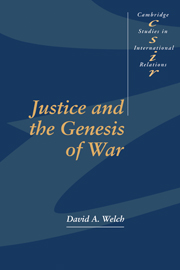Book contents
7 - JUSTICE AND INJUSTICE IN A GLOBAL CONTEXT
Published online by Cambridge University Press: 15 October 2009
Summary
Man, born in a family, is compelled to maintain society from necessity, from natural inclination, and from habit. The same creature, in his farther progress, is engaged to establish political society in order to administer justice, without which there can be no peace among them, nor safety, nor mutual intercourse.
David Hume, Essays, Moral and Political, Essay III, “Of the Origin of Government,” in Aiken, Hume's Moral and Political Philosophy, 311.[T]here is a far greater chance of conflicts in an unjust world.
RIO: Reshaping the International Order: A Report to the Club of Rome (New York: Dutton, 1976), 122.Of the five wars surveyed, the justice motive can only be said to have played an insignificant role in the outbreak of one: the Franco-Prussian war. The other four demonstrate that the justice motive can contribute to the outbreak of war in a complex variety of ways. Sometimes, as in the Crimean and the Falklands/Malvinas wars, hostilities can be the direct result of two conflicting and incompatible claims of justice. Russia and Turkey went to war in 1853 over the question of whether the protection of the Greek Orthodox church in the Ottoman empire lay by right with the Tsar or the Sultan. Britain and Argentina went to war in 1982 over the question of which country held legitimate title to the Falkland Islands.
- Type
- Chapter
- Information
- Justice and the Genesis of War , pp. 186 - 216Publisher: Cambridge University PressPrint publication year: 1993



